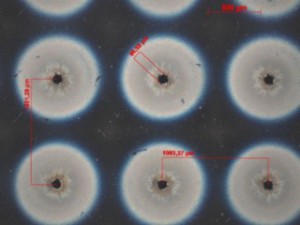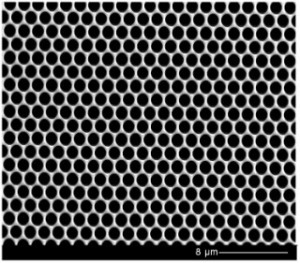A new filter system that allows the pollution of lakes and rivers to be measured faster and more easily is being developed by the Fraunhofer Center for Silicon Photovoltaics CSP together with partners. The goal of the research project under the auspices of the German Federal Institute for Materials Research and Testing (BAM) is to create a database to allow the pollution of lakes and rivers to be analyzed and subsequently reduced.

The entrainment of microplastics into our ecosystem is becoming a growing problem. It is still not totally clear today how the particles get into lakes and rivers and into waste water. Furthermore, there are no suitable and standardized methods for investigating and detecting the minute plastic particles in the water. A reliable scientific database on the sources, the occurrence and the effects of microplastic particles on the environment, however, is crucial for solving the environmental problem.
The research project “Representative diagnostic strategies for an integrative system understanding of the specific entrainment of plastics into the environment (RUSEKU)” launched by the German Federal Institute for Materials Research and Testing (BAM) aims by 2021 to develop a diagnostic method that allows the particle entrainment into lakes and rivers to be measured more quickly and in a standardized manner. It will also allow locations with a particularly high microplastic particle pollution of the water to be identified.
Quick and standardized measurement

As part of the joint research project, the Fraunhofer Center for Silicon Photovoltaics CSP is developing a special filter system together with SmartMembranes GmbH as part of a standardized and uncomplicated sampling method. The cascade filtration system will use special silicon filters with defined hole densities and sizes in which the plastic particles will be trapped.
“A crucial factor in achieving reliable conclusions as to the volumes of microplastic in groundwater, drinking water and waste water or in surface waters is the sampling method. A type of sampling set is planned that will make a major contribution in this direction,” says Dr. Christian Hagendorf, responsible for the research project at the Fraunhofer CSP. “Laser and chemical etching processes will be used to create appropriate hole sizes in the silicon substrate in which the particles will be retained. During the later analysis in the laboratory, we will use the chemical composition of silicon that is transparent over a broad wavelength range of infrared light in the transmission method and makes microplastic particles lying on it visible for the spectroscopic measurement technology,” adds Hagendorf.
Application-optimized filter system
A further important parameter for the quality of the filters is their mechanical strength, as the load conditions caused by the water stream during sampling must not result in breakage of the filters. Furthermore, the filters need to have a smart, optimized hole geometry and surface finish. A further goal of the work is to define a working procedure from sampling through cleaning right up to the analysis of the microplastic particles together with the partners. This “smart sampling” should enable the detection of microplastics – from the sampling up to the rapid analysis – to be perfectly tuned.
The method for efficient and reliable microplastic sampling that this makes possible offers a basis for strategies and measures that help to reduce microplastics in the water cycle. The joint research project is being funded by the Federal Ministry of Education and Research (BMBF) as part of the “Plastics in the environment” research topic. Involved in the project in addition to the Fraunhofer CSP are six further scientific institutions and three SMEs.
Source
Bioplastics MAGAZINE, 2018-08-28.
Supplier
Bundesanstalt für Materialforschung und -prüfung (BAM)
Bundesministerium für Bildung und Forschung (BMBF)
Fraunhofer-Center für Silizium-Photovoltaik CSP
SmartMembranes GmbH
Share
Renewable Carbon News – Daily Newsletter
Subscribe to our daily email newsletter – the world's leading newsletter on renewable materials and chemicals









